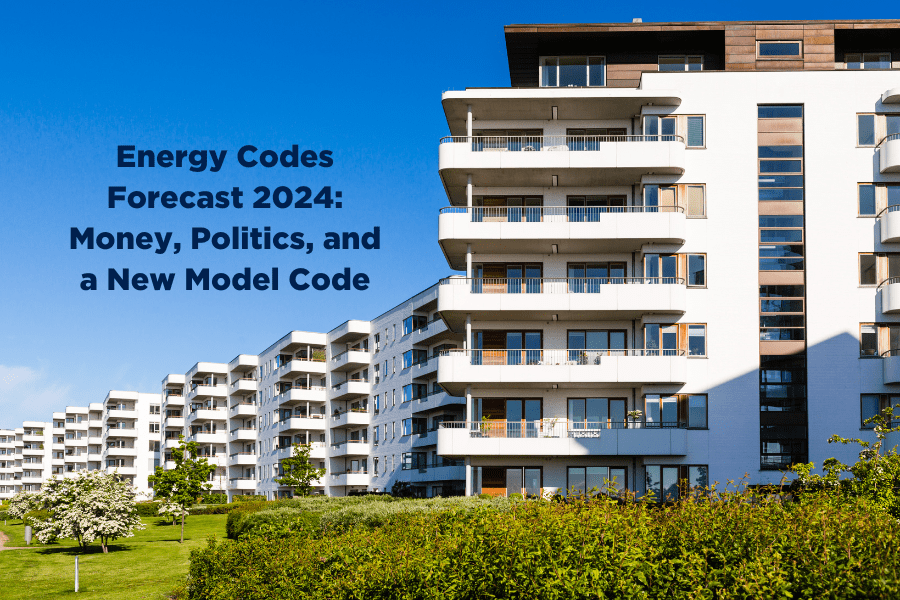
There’s nothing like a fresh new year to get me excited for goal setting and making progress. I’m not talking about starting an exercise regime or a whole foods diet, I’m talking about energy codes. Can a bench press help save carbon emissions from buildings? No, but energy codes can. Can legumes reduce energy utility costs for residents? No, but ENERGY CODES CAN.
Some may call me obsessed (I am) but I have good reason to be. Who doesn’t love healthier, safer, more affordable-to-operate buildings? So I’m back again in 2025 to share my annual energy code outlook: the good, the bad, the delightfully mired in political intrigue.
Federal Action & A Sassy Little Lawsuit

The push to get the Federal Housing Finance Agency (FHFA) to update energy code requirements for newly constructed houses in order for them to qualify for federally-backed mortgage loans is unlikely to move forward… at least for now.
Clearly that is disappointing. In terms of federal-level codes action, we can still cite the U.S. Department of Housing and Urban Development (HUD) and the U.S. Department of Agriculture (USDA) update to the 2021 IECC and ASHRAE 90.1-2019 as a major win in 2024. However, it looks like even that win is being contested as the National Association of Home Builders (NAHB) and 15 state attorneys general are suing HUD and USDA in response to the update.
NAHB claims “studies show” the new requirements will wildly increase the cost of construction and do little to lower energy use, despite analyses to the contrary. Now dear readers, it’s worth noting that NAHB leverages studies performed by NAHB’s independent subsidiary, the Home Innovations Research Lab (HIRL), so surely there’s no bias there. See this summary of a comparison study debunking HIRL’s use of inflated profit margins and cost data as one clear example.
Opponents to the energy code likely feel emboldened by the anti-green platform of the new administration, and it seems likely that HUD and USDA will end up settling…but my crystal ball has been wrong before.
FYI: Model Codes
Having officially kicked off in December, we’ll really be getting our hands dirty with the development of the 2027 International Energy Conservation Code (IECC) in the new year. Yours truly is a member of the residential Consensus Committee, so I’ll be getting my little efficiency mitts all over the code change proposals submitted by the public late last year.
Just a reminder: IECC committee meetings, subcommittee meetings, and work groups are open to the public. You can attend the virtual meetings and provide testimony—meeting links are found within the Meeting Notices posted to the ICC website. You can also sign up as an interested party to receive updates from ICC.
I’m feeling good about this cycle. The 2024 model code made some good improvements to the usability of the code, and while there were some rollbacks (I see you, insulation), the energy code is still (mostly) moving in the right direction.
Speaking of which…
The Department of Energy recently released their official Determination of ASHRAE 90.1-2022 and the residential 2024 IECC. Their analyses state that 90.1 would provide national average site energy savings of 9.8 percent of commercial building energy consumption compared to the 2019 version. And the prescriptive path of the residential 2024 IECC shows a national site energy savings of 7.8 percent and energy cost savings of approximately 6.6 percent of residential building energy consumption when compared to the base 2021 IECC. This is great news, if you ignore the ceiling insulation rollbacks and the allowance for wall insulation tradeoffs in the 2024 IECC.
BPS and Codes Technical Assistance

Are you plugged into the National Energy Code Collaborative? IMT (myself + my esteemed colleague Marshall Duer-Balkind) and ACEEE are co-leading the BPS/Code Alignment Technical Advisory Group (TAG). There are several other National Energy Codes Collaborative TAGs focusing on a variety of issues: everything from workforce development to equitable code implementation to community engagement. There’s something for everyone. If this sounds fun to you (it is), sign up to learn more.
I’d love to hear from you—what energy code work are you prioritizing in the new year? As always, reach out to me so we can continue to advocate for efficiency and affordability alongside you.

